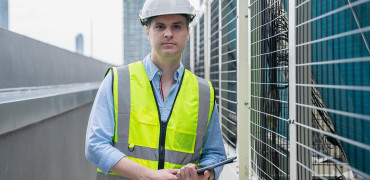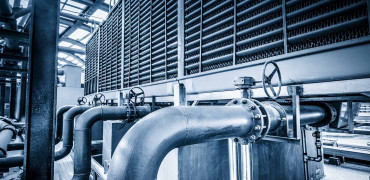One of the primary roles of facilities managers is dealing with risk.
In some ways, it’s at the heart of what FM is about – minimising the risk of failure of major building systems or managing risk for operatives working with hazardous equipment or materials.
Ensuring that a building and its systems comply with legislation, regulations and standards is vital to the role of facilities professionals.
That can sometimes be particularly challenging when balancing energy efficiency, for example, with indoor air quality. Reducing ventilation rates (and fan speeds) can save energy but may impact ventilation levels.
The drive to low-carbon buildings can also mean that facilities teams face a drive to adopt new technologies, which can feel like an added risk. For example, decarbonising a building by removing on-site gas boilers could mean specifying and operating heat pumps or chillers as an alternative approach to heating and hot water.
Risk management will always be necessary but we must also be ready for innovative solutions
Avoiding risk
The danger with constantly managing risk is that it can lead to risk aversion – being so cautious that it’s increasingly difficult to adopt new ways of thinking or behaving. With the challenges facing today’s built environment, we must be ready to discuss innovation without fear.
However, increasing energy costs and the need to reduce carbon emissions – along with regulations and legislation – have created a pressing need to adopt more innovative approaches to energy efficiency. This is particularly true for significant energy users such as HVAC systems.
Mitsubishi Electric’s Service and Maintenance team understands that S&M is essential to reducing the risk of failure of critical heating and cooling systems. But we also believe that innovation is vital to keep pace with the changing demands placed on today’s buildings.
This means that we also harness technology to optimise efficiency and reduce operational costs alongside ‘traditional’ service and maintenance support such as technical know-how and bespoke maintenance packages.
Look to the clouds
Remote monitoring harnesses the power of cloud-based technology to continuously monitor data on equipment performance, such as chillers, for example.
Mitsubishi Electric has its own dedicated control solution, MELCloud, which logs errors and provides live controls and weekly seasonal timers from a single device or location.
This innovative approach to service and maintenance gives a site-wide view of system performance to the FM team – and their service partners.
Engineers are alerted to changes in chiller operation and can check on the equipment remotely.
If necessary, they can make a site visit armed with a clear idea of the problem – reducing the time needed to fix it.
Predicting risk and failure
The major benefit of adopting remote monitoring technology is that it supports predictive maintenance.
It’s an excellent approach to reducing the risk of system failure by collecting and collating equipment operating data (e.g. internal temperatures, fan speed, etc) to predict when equipment might fail.
Mitsubishi Electric has extensive experience in the data centre sector, where cooling system breakdown can have catastrophic results, so we understand the value of predictive maintenance.
A further advantage of using innovative cloud-based monitoring is that it provides insights into energy use.
This is increasingly important as FM teams are often at the frontline of building owners' carbon reduction strategies. Detailed oversight on which equipment is performing less efficiently can quickly highlight the possible need for upgrades or refurbishments.
Risk management will always be necessary for facilities teams, but the challenge of making our buildings low-carbon and energy efficient means that we must also be ready to consider innovative solutions.
Kris Swiderski is Head of Service and Maintenance




